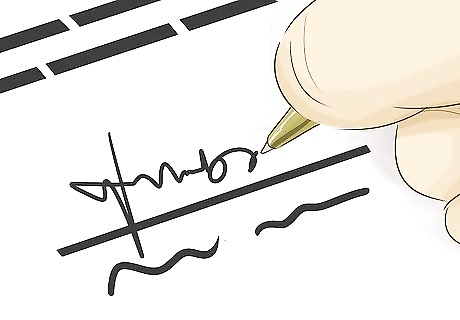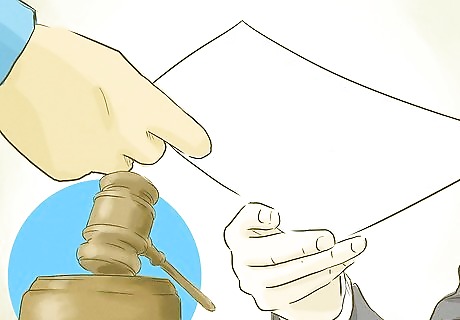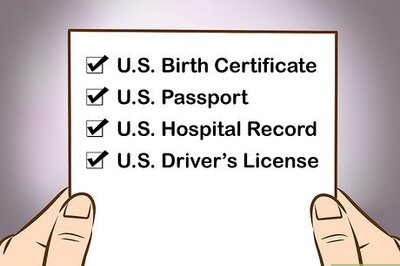
views
Suing in Justice or Small Claims Court

Choose the right court. Justice and small claims courts allow you to settle disputes involving smaller amounts of money using simplified, less formal procedures. However, your case must meet the requirements for a justice or small claims court to have jurisdiction. In Texas you must be over the age of 18 to file a suit in justice or small claims court. You also can file suit as an association, partnership, corporation, or other business entity, as long as you aren't a collection agency or in the business of lending money at interest. For example, if you own a construction business and you want to sue a contractor for damages worth $5,000, you can sue in small claims court. However, a bank couldn't use small claims court to sue you to collect on a $5,000 loan. Generally, small claims courts in Texas hear claims for money damages of $10,000 or less. If the damages actually are worth more than $10,000, the court doesn't have jurisdiction, even if you claim a lesser amount. In many states, you simply forfeit your claim to any greater damages if you file in small claims court. However, in Texas, if the evidence shows damages greater than $10,000, the court will dismiss your case. You can't get away with telling the court you're willing to settle for the smaller amount. For example, if the defendant caused $12,000 worth of damages to your car when he drove into a tree, you can't sue him for $10,000 in small claims court. Justice courts also are limited to claims under $10,000, but also have the ability to order defendants to do something such as return property, or enforce liens on real property. However, as with small claims the amount of property in contention must be $10,000 or less. You can only sue a business or person in Texas if they are present in the state. In the case of a person, this typically means you sue in the county where they live. If you want to sue a business, you generally must sue in the county where the company is headquartered or has an office.

Research your case. Before you draft your petition, gather information about your claim and make sure you can satisfy all legal requirements. Each type of claim has basic elements you must prove for the court to award you damages. For example, if you claim the defendant owes you money because you tripped on his porch, you must prove that he had some duty to maintain his porch so you wouldn't trip, that he failed to maintain it in a reasonable manner, and that you were injured as a result. Each type of claim also has a deadline called a statute of limitations, after which you can't file a lawsuit. In most cases, Texas law gives you two years after the dispute arose to file suit, but in some other situations you have as long as four years. You can read the applicable Texas law at http://www.statutes.legis.state.tx.us/.

Draft your petition. Each county court has forms you can use to open a case in justice or small claims court. The form will ask for your full name and address, as well as the full name and address of the person or company you're suing. If you're suing a business, check the Secretary of State's business records and make sure you're using the correct full legal name. Once you've identified the parties in the case, state in plain language the amount of your claim and its basis, including the date the dispute arose. Finish your petition by stating specifically the relief you request from the court. If you want the court to enforce a lien or order a transfer of property, you must identify the property. If you're seeking monetary damages, state a specific dollar amount you believe you are owed.

Draft your discovery requests. Limited discovery is allowed in justice or small claims courts in Texas, and you can file your requests along with your petition. Discovery is common in justice court cases. However, you must ask the judge for permission if you want to make discovery requests in a small claims case. Limited discovery typically is confined to written questions requiring sworn answers from the other side, or requests for the other side to produce certain documents or evidence that you believe you need to review to help evaluate your case.

Sign your petition. After you've completed your petition, read over it carefully before you sign it. When you sign it, you are swearing under oath that everything in the petition is true. In some cases, you may be required to sign your petition in the presence of a notary. Make copies of your completed petition along with any other documents or forms you intend to file – at least one for your own records and one for each person or business you're suing. The clerk will keep the originals when you file them.

File your petition. You must file your petition with the clerk of court in the county where your claim will be heard. When you file your petition, you must pay a filing fee as well as a service of citation fee, which covers the costs of serving the person you're suing. If you file in justice or small claims court, the clerk will take care of service for you. Filing fees for justice or small claims court are around $25. In addition to this, you'll pay a service fee of around $60 per defendant you need to have served.

Wait for the defendant's answer. From the date he is served with your petition, the defendant has roughly 10 days to file an answer and respond to any discovery requests you included. You should call the clerk two or three weeks after you file your petition and find out the exact date the defendant was served. The defendant's time period to answer is calculated from this date. To find the defendant's deadline to file an answer, count 10 days from the date of service. The first Monday after the last day of that period is your defendant's deadline to file an answer. Verify the date with the clerk and find out if the defendant has filed an answer. If the response period has expired and he has not filed an answer, you may win your case by default if you appear for your hearing. However, keep in mind you still have to prove your case to the judge.

Decide if you want to request a jury. Texas law allows either party in a small claims case to request a jury. If you want a jury, you must make your request no later than one day before your hearing is scheduled and pay a $5 fee. If no jury is requested either by you or the person you've sued, your claim will be heard by a single judge. At the same time, you can request subpoenas from the clerk if you have witnesses you want to appear at your final hearing. The clerk will issue as many subpoenas as you need, provided you have the full legal name and address of each witness and pay the appropriate fees. If you filed a sworn petition, the defendant must respond with a sworn answer. This means that if you signed your complaint in the presence of a notary, the defendant likewise must sign his answer in the presence of a notary.

Attend your hearing. You must attend the hearing of your claim or the court will dismiss your case. Some local rules require you to wait 45 days after the defendant files his answer before you set your case for trial. Talk to the clerk where you filed your claim and find out the rules that apply in that jurisdiction. If the defendant does not appear and he was properly served, you may win your case by default. You still have to prove to the judge that the defendant owes you the money or other relief you requested. If the defendant does appear, the judge will give you the opportunity to present your side of the case first. Procedures are less formal than in full court, but you may present any evidence you have or call any witnesses to testify on your behalf. After you present your case, the defendant will be given an opportunity to tell the court his side of things. If the defendant calls witnesses, you will be able to ask them questions to raise doubt about their statements. Once both sides have presented their cases, the judge will render his verdict.
Suing in State Civil Court

Make sure you have the right court. Before you start working on your case, you must figure out which court has appropriate jurisdiction over the subject matter of your lawsuit and the person or business you want to sue. Texas trial courts include district courts, county courts, justice courts, and municipal courts. District courts are civil courts of general jurisdiction, and can hear nearly any civil case if the amount in controversy is at least $200. The specific court also must have power to order the defendant to do something or pay you money if you win your case. Personal jurisdiction generally extends to people living in or doing business in that court's district. You also can sue in the court district where the incident happened that gave rise to the dispute.

Research your case. Organize all the documentation you have for your case and make sure you meet the legal requirements to state a claim. Before you file a lawsuit, you must check the law that applies to your type of claim and make sure you have a valid legal claim. You might consider asking an attorney about your case – even going to a free consultation can help you determine if you have a valid claim. You can read the state law that applies to your case on your own by going to http://www.statutes.legis.state.tx.us/. You also must check the statute of limitations that applies to your type of case. Statutes of limitations are deadlines after which you cannot file a lawsuit. For most cases in Texas, the statute of limitations is two years from the date the dispute arose – but in some cases you have as long as four years to file suit.

Search for forms. You may be able to find a form online that you can fill out to open your case with the state court. Many common forms also come with instructions for filling out the forms and filing them with the clerk. If you have instructions for your forms, make sure you read them thoroughly before you start filling out your forms.

Consider hiring an attorney. Although you can represent yourself in state court, an attorney has a better understanding of the laws involved, as well as court procedures and local rules. If you don't think you can afford an attorney to represent you in the case as a whole, you may be able to find one willing to review your forms and give you advice on a piecemeal basis. You also may qualify for free or reduced-fee representation through your local legal aid clinic or other programs offered by the local bar association. In some cases such as personal injury cases, attorneys generally work on contingency, so you don't need to worry about paying attorney's fees up front.

Draft your petition. Check local rules or use a petition filed in another case in the same court as a guide for how to format your petition correctly. Following the correct format, use the first paragraph of your complaint to state who you are and who you are suing. Then explain to the court in clear terms why you are suing the defendant. Set forth the facts of your case clearly, attaching evidence to support those facts as necessary. Describe the legal basis for your claim, citing a specific Texas law if you found the right law in your research, and explain how that law applies to the facts of your case. Close your petition by asking the court for specific relief, including a specific amount of monetary damages, and any other relief the court sees fit to award you. Leave space at the bottom of your petition to sign it, and type your contact information including your address, phone number, and email address.

File your petition. To initiate your lawsuit, you must file your petition and any other required forms in the clerk of court's office. Expect to pay around $300 to file your lawsuit. You can check with the court clerk before you bring your forms and find out the exact amount. If you cannot afford the filing fees, you can file a request for a waiver with the clerk. You must submit evidence of your inability to pay, including documentation of your income and financial records. You also must complete an affidavit of indigency, which must be signed in the presence of a notary.

Have the other side served. After you've filed your petition in civil court, you are responsible for making sure all defendants have legal notice of the lawsuit against them. The court clerk will issue a citation and help you arrange for a process server, typically a sheriff's deputy, to serve the papers on the other side. You must pay a fee for service of process, typically around $60.

Participate in discovery. Before your trial, you have the opportunity to exchange information with the other side as you prepare your case. The Texas Rules of Civil Procedure outline discovery plans you can choose. Through these plans, you have the opportunity to exchange written questions, or request documents and records or examine other property. Either you or the other party also may request depositions of each other or witnesses in the case. A deposition is an interview in which the person answers questions under oath while a court reporter records a transcript of the proceedings. If you receive any written discovery or deposition requests, make sure you respond fully within the amount of time set out in the court rules.

Attempt to settle your case. Some courts may require mediation before a final trial is scheduled. If the judge requires mediation, you must meet with a neutral third-party and attempt to work out a compromise with the other side to resolve your claim. Court-ordered mediation also requires you to report to the judge regarding the outcome of mediation before you can have your case set for trial.

Prepare for trial. If you cannot reach settlement with the other side on your case, the matter will be decided in a trial before the court. Organize your evidence and arrange for all witnesses you intend to call to be in court for the scheduled trial date. Generally you must prepare an opening statement at the beginning of the trial and a closing statement after the trial is over, so make notes for those statements. You also should practice interviewing witnesses and write a list of questions you intend to ask. When both sides have presented their cases, the judge will make his decision and issue an order.
Suing in Federal Court

Meet the requirements for federal jurisdiction. A federal court cannot hear your case unless you are able to demonstrate that the court has jurisdiction over both the subject matter of your lawsuit and the individual or company you are suing. Although state courts can hear almost any civil suit, federal courts can only hear lawsuits that deal with violations of federal law or the U.S. Constitution, suits against the federal government, or suits in which the defendant lives in a different state and the amount in controversy is more than $75,000. Beyond filing in federal court, you must make sure you file in the right district. There are seven districts in Texas, and generally you want to file in the district where the defendant lives or where the events that gave rise to your claim occurred.

Consider hiring an attorney. Because federal court rules and procedures are extremely complex, you should consider consulting an attorney before you attempt to represent yourself. Although you have the right to represent yourself in federal court, you will be expected to know all the rules and procedures just as any attorney would. Hiring an attorney can help you ensure that you don't make a mistake, especially considering you have no way of knowing how lenient your judge may be with you if you do something incorrectly. If you don't think you can afford an attorney, you can check at legal aid clinics or your local bar association to find out if you qualify for free or reduced-cost representation.

Research your case. The law that applies to your case sets forth the basic elements you must prove and other requirements that must be met for you to win your case. To have a legal claim, you must be able to point to a particular federal or state statute that entitles you to recover money or other remedies for the wrongs the defendant committed. You also must be able to prove that the statute of limitations has not passed. Each type of case has a statute of limitations that provides a deadline for you to file a lawsuit. If that deadline has passed, you no longer have the right to sue. If you're filing a lawsuit against a federal agency, the law requires you to exhaust administrative remedies before you file suit in federal court. Typically you'll know if you've done this because the agency will send you a letter stating that you have the right to sue.

Draft your complaint. The federal court clerk's office can provide information on the local rules and format necessary for your complaint. The clerk's office also may have a blank complaint form that you can adapt to your case. Rule 8(a) of the Federal Rules of Procedure describes the particular information that must be included in your complaint. Generally, you want to start by listing your name and address, as well as the full legal names and addresses of each defendant, and why you're suing. Then explain why you believe the court has the power to hear the case and make a decision. Explain what the defendant did and why you believe he is responsible for your injuries, and then lay out the facts of your case in numbered paragraphs. Once you've completed your facts, state the law that provides you with a remedy, and how that law applies to your facts. Close out your complaint by stating specifically what you believe the defendant owes you. Leave space for your signature, then include your printed name under your signature along with contact information such as your address, phone number, and email address.

Draft other required documents. The federal district court requires you include other forms such as a civil cover sheet and a summons along with your complaint. The clerk's office will have information on the forms you must include with your complaint. Once you've filled everything out and signed it, make at least one copy for your own records as well as a copy for each person you're suing – the clerk will keep the originals for the court files.

File your complaint. To initiate a lawsuit in federal court, you must file your complaint – along with any other required forms such as a civil cover sheet – with the clerk of the federal district court. When you file your complaint, the clerk will assign a case number and judge for your case. You must include your case number on any subsequent documents you file with the court for your case. You also must pay a $400 filing fee when you file your complaint. If you cannot afford the filing fees, you can file an application for a waiver. This application requires you to disclose details about your income and finances. If the judge approves your application, you can proceed without paying filing fees.

Have the other side served. After you've filed your complaint, you are responsible for making sure the person or company you're suing has legal notice of the suit. Rule 4 of the Federal Rules of Civil Procedure sets forth the proper legal methods to serve the defendant. Typically, you will send copies of the documents using certified U.S. mail, returned receipt requested.

Participate in discovery. Before trial, you can prepare your case by exchanging information with the other side during the discovery process. Both you and the other side may send each other interrogatories, which are written questions that must be answered under oath. These questions can only be sent to parties in the case. You also may participate in depositions, which are interviews held under oath and on the record. After the interview is completed, the court reporter provides a transcript of the interview which you can use in trial. For example, if the witness says something on the stand at trial that contradicts a statement she made during the deposition, you can introduce her deposition testimony to impeach her credibility.

Attend mediation. If you are otherwise unable to arrive at a settlement, a neutral, third-party mediator may be able to help you resolve your dispute. Some federal judges may order mediation before you proceed to trial. The process is informal and non-binding, but can produce a compromise that eliminates the need for a full trial.

Prepare for trial. If you cannot settle your case, the court will set a date for a final trial.

















Comments
0 comment